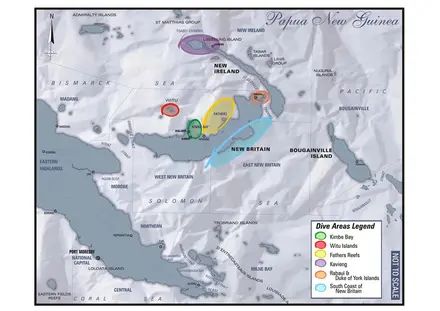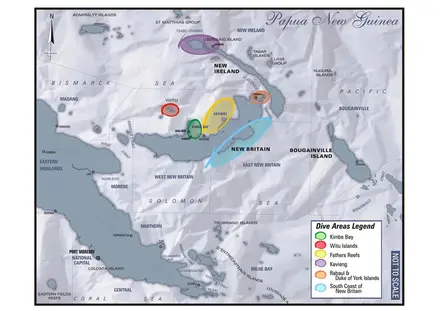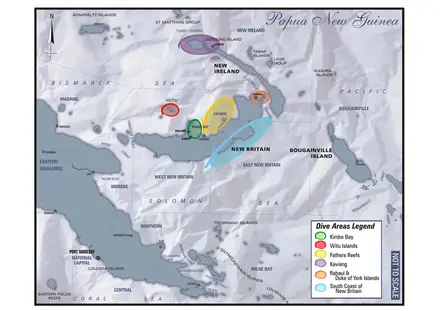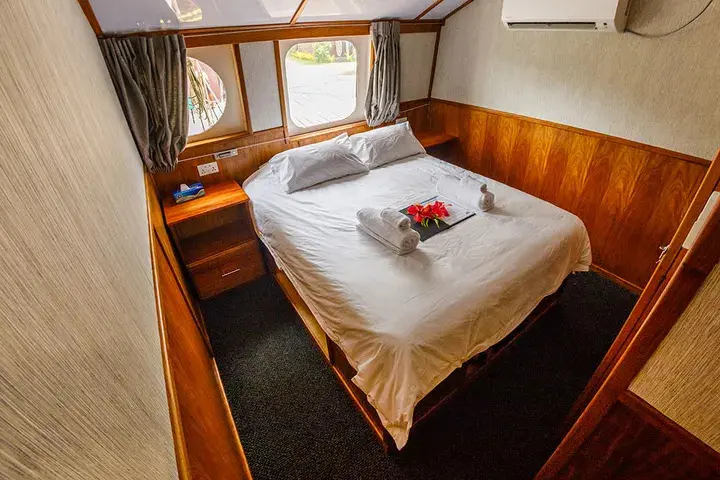Located in the Coral Triangle, Papua New Guinea is the centre of great marine biodiversity and is home to pristine reefs, a wide variety of fish and a multitude of shark species such as silky sharks and hammerheads.
Dolphins regularly accompany the boat to entertain divers and occasionally orcas, whale sharks and pilot whales are also spotted. The Oceania offers a variety of itineraries that change depending on the season and weather to ensure the best possible diving. The large dive deck at the stern of the boat includes individual storage areas, a camera table and a bathroom with shower. A dinghy is available to make access to the dive sites easy and stress-free.
This website uses Google Maps to embed map material. Please note that your personal data may be collected in the process. To view the Google Maps map, please agree that it is loaded from the Google server.
The Oceania catamaran is ready for exciting luxury diving cruises in Papua New Guinea. The Oceania is located at the Walindi Resort and can accommodate up to 16 guests in 8 cabins. Each cabin is fully air-conditioned and features an en-suite bathroom, fresh towels daily, storage space, hairdryer and stunning ocean views. Guests have the choice of outdoor communal areas where they can relax during their stay on board the Oceania. On the main deck is the indoor saloon and dining room, which is air-conditioned for your comfort. There is also an outdoor lounge and barbecue area on the same level, and the upper deck offers space for sunbathing and al fresco dining.

Bismarck Sea Signature (Kimbe Bay - Kimbe Bay) 10D/9N
The Bismarck Sea Signature itinerary includes diving in Kimbe Bay, the Witu Islands and the Fathers Reefs. The dive sites visited are at the captain's discretion and are weather dependent.
Kimbe Bay is home to stunning reefs with the brilliant coral formations you see in all the classic Walindi images. Beautiful and dramatic seamounts, coral laden walls and lush coral gardens are a feature of diving in Kimbe Bay, along with the myriad fish and invertebrates that the reefs harbour.
The Witu Islands are an archipelago of volcanic origin to the north-west of Kimbe Bay. The diving is a mixture of seamounts rising from deep waters to within a few metres of the surface (such as Lama shoals), beautiful coral arches and great night dives in the islands' black sand bays. Lots of interaction with the locals who also trade fresh fruit and veg from their canoes.
Fathers Reefs are a series of offshore reefs, also of volcanic origin, along the north coast of East New Britain. The underwater topography is stunningly different with dramatic reef landscapes, arches and swim-throughs. As these reefs are offshore, they also attract pelagic activity such as sharks, rays, turtles, schools of barracuda and mackerel etc.
The last dive takes place on the penultimate day of the trip before 12 noon. Divers are advised to wait 24 hours after the last dive before flying.

Fathers Reefs and Kimbe Bay Itinerary (Kimbe Bay - Kimbe Bay) 10D/9N
The Fathers Reefs and Kimbe Bay itinerary includes diving at the Fathers Reefs, a group of offshore reefs along the north coast of New Britain and the outer reefs of Kimbe Bay. The dive sites visited are at the captain 's discretion and are weather dependent.
Fathers Reefs are a series of offshore reefs that are volcanic in origin. The underwater topography is amazingly different with dramatic reef landscapes, arches and swim-throughs. As these reefs are offshore, they also attract pelagic activity such as sharks, rays, turtles, schools of barracuda and mackerel, etc.
Kimbe Bay is home to stunning reefs with the brilliant coral formations you see in all the classic Walindi pictures. Beautiful and dramatic seamounts, coral laden walls and lush coral gardens are a feature of diving in Kimbe Bay, along with the myriad fish and invertebrates that the reefs harbour.
The last dive takes place on the penultimate day of the trip. Divers are advised to wait 24 hours after the last dive before flying.
Sample itineraries and maps are for illustrative purposes only. The exact route and locations visited may change depending on local regulations, guest experience, weather and logistics and are at the captain's discretion.

East and West New Britain Itinerary (Kimbe Bay - Rabaul). 9D/8N
The East & West New Britain itinerary includes diving along the north coast of New Britain and Rabaul (Outer Kimbe Bay Reefs, Fathers Reefs, Bainings area and Rabaul).
The dive sites visited are at the captain's discretion and are weather dependent.
The Fathers Reefs are a series of offshore reefs of volcanic origin along the north coast of West New Britain. The underwater topography is stunningly different with dramatic reef landscapes, arches and swim-throughs. As these reefs are offshore, they also attract pelagic activity such as sharks, rays, turtles, schools of barracuda, mackerel, etc.
Diving in the Bainings area
There is an abundance of macro life when diving in Rabaul, usually centred around various jetties. Please note that we do not dive the wrecks in Rabaul. These are specialised dives and we recommend diving the wrecks with local operators.
Kimbe Bay is home to stunning reefs with the brilliant coral formations you see in all the classic Walindi images. Beautiful and dramatic seamounts, coral laden walls and lush coral gardens are a feature of diving in Kimbe Bay, along with the myriad fish and invertebrates that the reefs harbour.
The last dive takes place before 12 noon on the penultimate day of the trip. Divers are advised to wait 24 hours after the last dive before flying.
Double or Twin Cabins
- 1 double or 2 single beds,
- en-suite bathroom,
- adjustable air conditioning,
- 2 guests
Included: VAT, airport transfers, hotel transfers, tea & coffee, drinking water, wine with dinner, snacks, full board (all meals), dive packages, towels for use on deck, cabin towels, complimentary toiletries, beach towels, laundry/ironing service.
Mandatory extras: environmental tax.
Optional extras: gratuities, alcoholic drinks, soft drinks, equipment hire, Nitrox course, diving courses.
Prices for rental equipment:
Rental equipment is available on this ship. Please indicate what you need on the booking form. Details below of what is included and the additional prices.
- Regulator 20 USD per day
- BCD 20 USD per day
- Fins 15 USD per day
- Mask 15 USD per day
- Nitrox bottle 10 USD
- Torch 15 USD per day
- Dive computer 25 USD per day
- Full equipment (with: regulator, BCD, fins, mask, dive computer) 70 USD per day
- Wetsuit 15 USD per day
- Air temperature: Warm all year round with average temperatures between 26.5 °C and 27.5 °C
- Water temperature: Stable temperatures between 28.0 °C and 29.0 °C, ideal for diving.
- Rainfall: Highest rainfall in the months of January to March, lower values in July and August.
Papua New Guinea is located in the south-west Pacific, north of Australia. It comprises the eastern part of the island of New Guinea as well as numerous offshore islands (e.g. New Britain, New Ireland, Bougainville).
The best-known diving regions are located on the north and east coast, including at
Tufi
Milne Bay
Kimbe Bay
Kavieng
Alotau
Rabaul
Walindi
The country is characterised by dense rainforests, volcanoes, fjords and a rugged coastline - spectacular both above and below the water.
Population
PNG has a population of around 10 million, with one of the most diverse ethnic compositions in the world. Over 800 different languages and numerous cultures - many isolated villages with traditional ways of life.
The population is predominantly Melanesian, with a strong focus on local tribal identities.
Many people live in isolated rural areas, often without access to modern infrastructure.
Religions
Over 95 % of the population is Christian, in particular:
Catholics
Evangelicals
Anglicans
At the same time, traditional beliefs and spiritual rituals (ancestor worship, nature spirits) continue to exist - mostly syncretised with Christianity.
Economic situation
PNG is a country with a weak development economy and a wealth of natural resources (e.g. gold, copper, oil, gas). The wealth hardly reaches the population; great poverty and inadequate infrastructure characterise many regions.
Main economic sectors:
Raw material exports
Agriculture/fishing
Tourism (still small, but growing)
Significance for international diving tourism
PNG is not a mass destination, but an exclusive destination for experienced divers and underwater photographers. The reefs are among the most bio-diverse in the world, part of the Coral Triangle.
Macro and muck diving
Big fish watching
Wreck diving (especially WWII wrecks)
Unspoilt reefs and remote dive sites
Economic impact of the diving industry
Although the share of tourism in GDP is small, diving tourism is of great importance locally:
Jobs in dive resorts, boat crews, transfers, crafts and catering
Development aid projects supported by sustainable tourism
Cooperation with village communities that control access to reefs
Eco-lodges such as Walindi, Tufi Dive Resort or Lissenung Island Resort work closely with the local population.
Main target group: international diving travellers with a high budget, often via liveaboards or in combination with nature/culture trips.
Why Papua New Guinea is a favourite destination for divers
- Unspoilt reefs with extreme biodiversity
Few dived, exclusive spots - often completely alone in the open sea
WWII wrecks in Madang, Kavieng, Rabaul and others
Spectacular muck diving - rare critters, nudibranchs, frogfish
Exotic culture & landscape - combination of diving and jungle
Excellent visibility, especially in the dry months
Community-based ecotourism, often embedded in sustainable projects
Best time to visit: April-November (varies slightly depending on the region)

